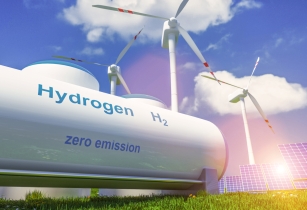Bosch has been planning to invest up to US$519mn towards the development of electrolyser components under its mobility solutions business sector by the end of the decade
When it comes to green hydrogen, Bosch is stepping on the gas: in the interest of effective climate action, the company is planning not only to use this new fuel, but also to be one of the companies producing it. ?We cannot afford to delay climate action any longer, so we aim to use Bosch technology to support the rapid expansion of hydrogen production in Europe,? said Dr Stefan Hartung, chairman of the board of management of Robert Bosch GmbH, at the presentation of the company?s annual figures. ?To do this, we will leverage our know-how in fuel-cell technology,? added Dr Markus Heyn, member of the board of management of Bosch and chairman of the mobility solutions business sector.
In light of energy diversification, the move away from fossil fuels, and the need to reduce CO2 emissions, demand for green hydrogen is growing rapidly ? not only in energy-intensive industries such as steel, chemicals, and heavy-duty freight, but also in private real estate. According to a report published by PwC, demand for green hydrogen across the GCC is expected to grow significantly in the medium term, reaching about 530 million tonnes by 2050.
Bosch to develop the stack ? the core component of an electrolyser
As in the fuel cell, the key component of an electrolyser is a stack, which comprises several hundred individual cells connected in series. In each of these cells, electricity is used to split water into hydrogen and oxygen. This is the reverse of what takes place in a fuel cell, where electricity is generated by combining hydrogen and oxygen. In both cases, the chemical reaction is facilitated by means of a proton-exchange membrane (PEM). Bosch is collaborating with a number of partners to develop a way of combining the electrolyser stack with a control unit, power electronics, and various sensors to create a ?smart module?. With pilot plants scheduled to commence operation in the coming year, the company plans to supply these smart modules to manufacturers of electrolysis plants and industrial service providers from 2025 onward. Using a simple process, Bosch will incorporate a number of these compact modules. To maximise the efficiency of hydrogen production and extend the service life of the stack, the smart modules are to be connected to the Bosch cloud.
Bosch can use its strengths in mass production and economies of scale
Unlike many of the electrolyser components currently on the market, the Bosch smart modules will be mass produced. As such, the manufacturing operation will generate economies of scale. ?Two key factors are involved in ramping up hydrogen production: speed and cost,? Heyn said. ?This is where we can play to our strengths, thanks to our expertise in mass production and our automotive know-how.? Bosch is now planning to start volume production as quickly as possible at a number of European locations.
Bosch portfolio expansion will safeguard jobs
The ongoing transformation of the automotive sector presents a huge challenge for the industry as a whole. As ever, Bosch?s response here is to innovate. In entering a new field of business ? one that will add a nonautomotive wing to its mobility solutions business ? the company is seizing the opportunity to further safeguard employment. In the coming years, this expansion into electrolyser components is expected to create work for hundreds of associates. ?In fact, we?re doing three things at once,? Heyn said. ?We?re making an important contribution ecologically, economically, and socially.
Bosch is working on mobile and stationary fuel cells
Bosch firmly believes in hydrogen as a future fuel, and is also working on both stationary and mobile fuel cells. One intended use for the former is as small, on-site power plants for cities, data centers, shopping malls, business parks, and as charge spots for electric vehicles. Bosch plans to use mobile fuel cells to facilitate the climate-neutral shipping of goods and commodities, initially by truck. The company?s portfolio of vehicle-related products in this field ranges from individual sensors to core components such as the electric air compressor, the stack, and complete fuel-cell modules.






